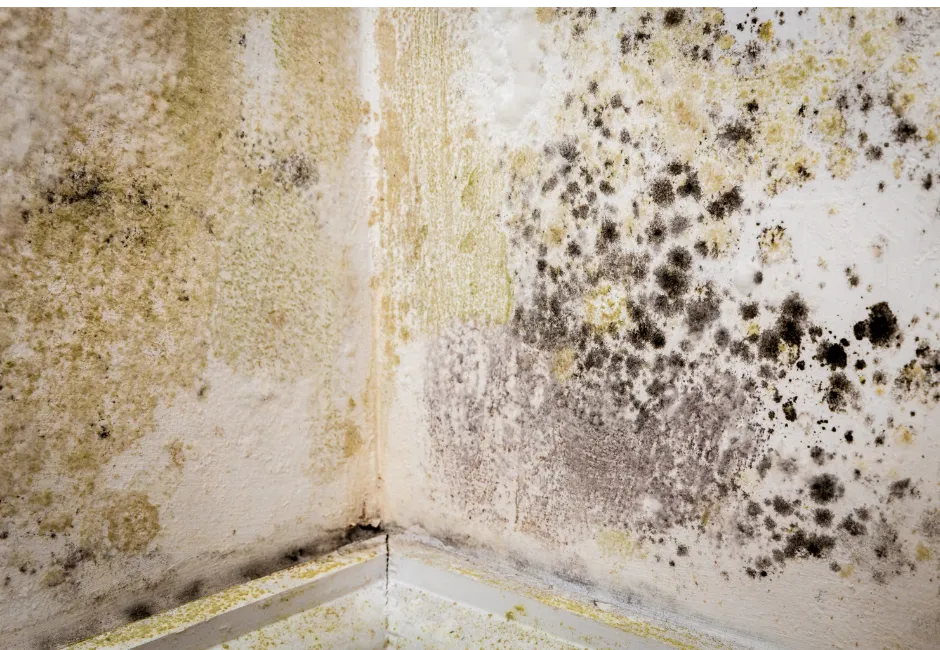Book A Call Now

Unseen Threat: The Health Impacts of Black Mould in Your Home
Your cozy haven might be hiding a silent intruder: black mould. Often unnoticed, this unwelcome guest can pose severe risks to your health. From your walls to your drinkware, black mould can appear anywhere moisture lurks, wreaking havoc on your well-being.
Understanding Black Mould:
Black mould, scientifically known as Stachybotrys chartarum, thrives in damp, humid environments. Its distinctive black or dark green appearance sets it apart, but its threat and impact on health is the real concern. Exposure to its spores and toxins can trigger various health issues, making it crucial to identify and eradicate this intruder.
Let’s delve deeper into the short-term and long-term effects of black mould poisoning.
Short-Term Effects of Black Mould Poisoning:
1. Respiratory Problems: Exposure to black mould spores can trigger immediate respiratory issues, including coughing, wheezing, and shortness of breath. Individuals with pre-existing conditions like asthma might experience exacerbated symptoms.
2. Nasal and Sinus Irritation: Contact with mould spores can lead to nasal congestion, sneezing, and sinus headaches. Allergic reactions may intensify, causing discomfort and affecting daily activities.
3. Skin and Eye Irritation: Direct contact with black mould or its spores can result in skin rashes, redness, or irritation. Eye symptoms such as itchiness, redness, and watering can also occur upon exposure.
4. Fatigue and Headaches: Some individuals might experience fatigue or headaches after exposure to black mould. This can affect productivity and overall well-being.
Long-Term Effects of Black Mould Poisoning:
1. Chronic Respiratory Conditions: Prolonged exposure can contribute to the development of chronic respiratory issues like asthma, bronchitis, or recurrent pneumonia. Mould toxins can irritate the respiratory tract, leading to persistent problems.
2. Neurological Symptoms: Black mould exposure has been associated with neurological issues such as headaches, dizziness, difficulty concentrating, and even memory loss. These symptoms can persist or worsen with continued exposure.
3. Immune System Suppression: Mould toxins might compromise the immune system, making individuals more susceptible to infections. Recurrent illnesses or an increased vulnerability to various health conditions could result from long-term exposure.
4. Organ Damage: In severe cases or prolonged exposure, black mould toxins may harm vital organs. While less common, this level of damage can have serious and lasting health implications.
The effects of black mould poisoning can vary widely among individuals based on their sensitivity, duration of exposure, and overall health condition. Addressing mould issues promptly is crucial to minimize health risks.
Where Black Mould Lurks:
Black mould can be found in various places around the house:
- Damp Areas: Bathrooms, basements, and kitchens.
- Household Items: Carpets, upholstery, and even drinkware and Tupperware.
- Hidden Spaces: Behind walls, under sinks, or in poorly ventilated areas.
How Does Black Mould Enter the Body?
Inhalation remains the primary route of exposure. Additionally, touching contaminated surfaces and then touching the face can transfer spores. Ingesting mould-contaminated food or drinkware can also lead to exposure.
Eradicating Black Mould:
- Identify and Fix Water Leaks: Address moisture sources promptly.
- Thorough Cleaning: Use mould-killing solutions for affected areas.
- Improve Ventilation: Enhance airflow in damp areas.
- Professional Help: Consider experts for extensive infestations.
Remedies for Black Mould Poisoning:
- Air Purification: Use HEPA filters to trap mould spores.
- Natural Remedies: Vinegar, hydrogen peroxide, or tea tree oil for cleaning.
- Boosting Immunity: A balanced diet, regular exercise, and adequate sleep.
- Consult a Physician: Seek medical advice for severe symptoms.
Black mould isn’t just an eyesore; it poses a significant risk to health. Regular inspection, maintenance, and prompt action against moisture can prevent its growth. Should you suspect mould infestation or experience related symptoms, taking swift action and seeking professional help is crucial for safeguarding your health and well-being.
Remember, your home should be a sanctuary, not a source of health concerns. Stay vigilant and prioritize a healthy living environment for you and your loved ones.




